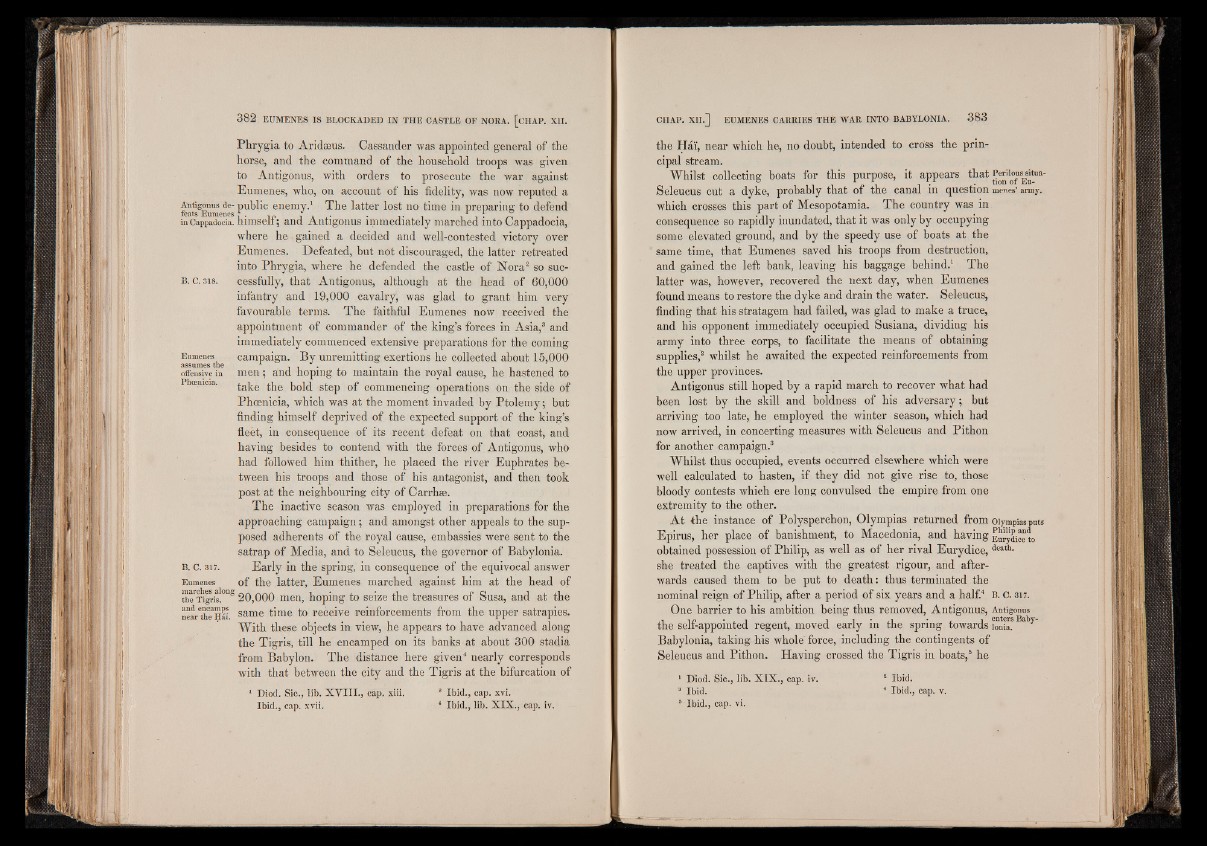
Aiitigonus defeats
Eumenes
in Cappadocia.
B. C. 318.
Eumenes
assumes the
offensive in
Phoenicia.
Phrygia to Aridæus. Cassander was appointed general of the
horse, and the command of the household troops was given
to Antigonus, with orders to prosecute the war against
Eumenes, who, on account of his fidelity, was now reputed a
public enemy.1 The latter lost no time in preparing to defend
himself; and Antigonus immediately marched into Cappadocia,
where he gained a decided and well-contested victory over
Eumenes. Defeated, but not discouraged, the latter retreated
into Phrygia, where he defended the castle of Nora2 so successfully,
B. C. 317.
Eumenes
marches along
the Tigris,
and encamps
near the Hai.
that Antigonus, although at the head of 60,000
infantry and 19,000 cavalry, was glad to grant him very
favourable terms. The faithful Eumenes now received the
appointment of commander of the king’s forces in Asia,3 and
immediately commenced extensive preparations for the coming
campaign. By unremitting exertions he collected about 15,000
men ; and hoping to maintain the royal cause, he hastened to
take the bold step of commencing operations on the side of
Phoenicia, which was at the moment invaded by Ptolemy; but
finding himself deprived of the expected support of the king’s
fleet, in consequence of its recent defeat on that coast, and
having besides to contend with the forces of Antigonus, who
had followed him thither, he placed the river Euphrates between
his troops and those of his antagonist, and then took
post at the neighbouring city of Carrhæ.
The inactive season was employed in preparations for the
approaching campaign ; and amongst other appeals to the supposed
adherents of the royal cause, embassies were sent to the
satrap of Media, and to Seleucus, the governor of Babylonia.
Early in the spring, in consequence of the equivocal answer
of the latter, Eumenes marched against him at the head of
20,000 men, hoping to seize the treasures of Susa, and at thé
same time to receive reinforcements from the upper satrapies.
With these objects in view, he appears to have advanced along
the Tigris, till he encamped on its banks at about 300 stadia
from Babylon. The distance here given4 nearly corresponds
with that between the city and the Tigris at the bifurcation of
Diod. Sic., lib. X V I I I ., cap. xiii.
Ibid., cap. xvii.
Ibid., cap. xvi.
Ibid., lib. X IX ., cap. iv.
the Hai, near which he, no doubt, intended to cross the principal
stream.
Whilst collecting boats for this purpose, it appears that ^ !10°"sEsi‘ua‘
Seleucus cut a dyke, probably that of the canal in question menes’ army,
which crosses this part of Mesopotamia. The country was in
consequence so rapidly inundated, that it was only by occupying
some elevated ground, and by the speedy use of boats at the
same time, that Eumenes saved his troops from destruction,
and gained the left bank, leaving his baggage behind.1 The
latter was, however, recovered the next day, when Eumenes
found means to restore the dyke and drain the water. Seleucus,
finding that his stratagem had failed, was glad to make a truce,
and his opponent immediately occupied Susiana, dividing his
army into three corps, to facilitate the means of obtaining
supplies^ whilst he awaited the expected reinforcements from
the upper provinces.
Antigonus still hoped by a rapid march to recover what had
been lost by the skill and boldness of his adversary; but
arriving too late, he employed the winter season, which had
now arrived, in concerting measures with Seleucus and Pithon
for another campaign.3
Whilst thus occupied, events occurred elsewhere which were
well calculated to hasten, if they did not give rise to, those
bloody contests which ere long convulsed the empire from one
extremity to the other.
At the instance of Polysperchon, Olympias returned from oiympias puts
Epirus, her place of banishment, to Macedonia, and having E u n i c e to
obtained possession of Philip, as well as of her rival Eurydice, death-
she treated the captives with the greatest rigour, and afterwards
caused them to be put to death: thus terminated the
nominal reign of Philip, after a period of six years and a half.4 B. c. 317.
One barrier to his ambition being thus removed, Antigonus, Antigonus
the self-appointed regent, moved early in the spring towards louSfBaby"
Babylonia, taking his whole' force, including the contingents of
Seleucus and Pithon. Plaving crossed the Tigris in boats,8 he
1 Diod. Sic., lib. X IX ., cap. iv.
3 Ibid.
8 Ibid., cap. vi.
! Ibid.
4 Ibid., cap. v.